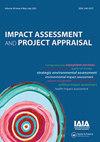Social license to operate applied to small hydroelectric power plants: community perspectives and reflections
IF 1.9
4区 社会学
Q3 ENVIRONMENTAL STUDIES
引用次数: 0
Abstract
ABSTRACT Social License to Operate (SLO) is a way to ensure community acceptance for entrepreneurial operations. This study describes and discusses the perspectives from communities, and external agents involved in SLO acquisitions and maintenance for a Small Hydroelectric Power Plant (SHP). Then, we reflect upon SLO applications for fair socio-environmental management. We used a case study for the research design. Data were collected using documents provided by the entrepreneur and semi-structured interviews of 15 stakeholders. We performed content analysis on the information obtained, along with literature discussion. Community representatives and external stakeholders reported not knowing about the SLO term and expected more benefits for the affected region. We observed that the main characteristic SLO results occurred in the phases preceding project operations. After the project was completed, the relationship among the parties weakened. Although it can’t be possible to measure SLO level based on data from this case study, we point that SLO must take participatory systems, collective work, environmental protection, and social guarantees into account at all enterprise life cycle, to promote honest pathways for regional development. This study can contribute to discussions on implementing SLO in new contexts, such as SHP.社会许可证在小型水力发电厂的应用:社区视角与思考
社会经营许可证(SLO)是确保社区接受创业经营的一种方式。本研究描述并讨论了参与小型水电厂SLO收购和维护的社区和外部代理人的观点。然后,我们反思SLO在公平社会环境管理方面的应用。我们在研究设计中使用了一个案例研究。数据是使用企业家提供的文件和对15名利益相关者的半结构化访谈收集的。我们对获得的信息进行了内容分析,并进行了文献讨论。社区代表和外部利益相关者报告称,他们不知道SLO的期限,并预计会为受影响地区带来更多好处。我们观察到,SLO的主要特征结果发生在项目运营之前的阶段。项目完成后,双方关系有所缓和。尽管不可能根据本案例研究的数据来衡量SLO水平,但我们指出,SLO必须在整个企业生命周期中考虑参与制、集体工作、环境保护和社会保障,以促进区域发展的诚实道路。这项研究有助于讨论在新的背景下实施SLO,例如SHP。
本文章由计算机程序翻译,如有差异,请以英文原文为准。
求助全文
约1分钟内获得全文
求助全文
来源期刊

Impact Assessment and Project Appraisal
ENVIRONMENTAL STUDIES-
CiteScore
4.60
自引率
22.70%
发文量
52
期刊介绍:
This is the international, peer-reviewed journal of the International Association for Impact Assessment (IAIA). It covers environmental, social, health and other impact assessments, cost-benefit analysis, technology assessment, and other approaches to anticipating and managing impacts. It has readers in universities, government and public agencies, consultancies, NGOs and elsewhere in over 100 countries. It has editorials, main articles, book reviews, and a professional practice section.
 求助内容:
求助内容: 应助结果提醒方式:
应助结果提醒方式:


